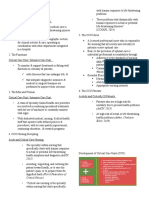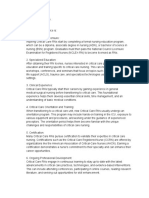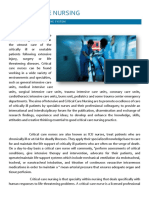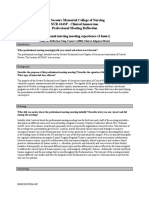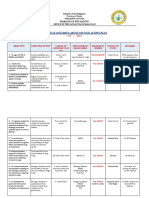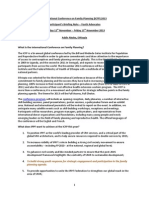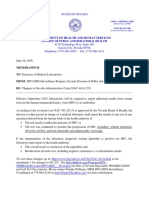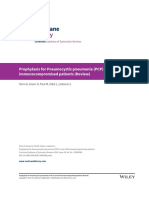The Trauma Nursing Core Course (TNCC) is a specialized training program designed for
registered nurses (RNs) to enhance their skills in the assessment and management of trauma
patients. The course focuses on the rapid identification and treatment of life-threatening injuries,
promoting a systematic, evidence-based approach to trauma care in emergency and critical care
settings.
Key Components of TNCC:
1. Initial Assessment and Triage: Emphasizing the "Primary Survey," TNCC teaches
nurses how to assess and stabilize a trauma patient quickly. This includes evaluating the
airway, breathing, circulation, disability (neurological status), and exposure/environment
(ABCDE).
2. Advanced Trauma Management: Nurses are trained to recognize and manage critical
injuries such as head trauma, chest trauma, abdominal trauma, and pelvic fractures, often
working alongside other members of a trauma team.
3. Trauma Pathophysiology: The course provides an understanding of the physiological
processes and changes that occur in trauma patients, helping nurses make informed
decisions about treatment and intervention.
4. Patient Stabilization: TNCC emphasizes the importance of early and aggressive
intervention to prevent deterioration in the patient's condition.
5. Teamwork and Communication: The course encourages effective communication and
teamwork among healthcare providers in trauma scenarios, which are often high-stress
and fast-paced.
6. Skills Stations: TNCC includes hands-on skills stations where participants can practice
procedures like airway management, advanced wound care, and splinting techniques.
7. Case Scenarios: Nurses are exposed to a variety of trauma cases through realistic
simulations, helping them practice critical thinking and decision-making under pressure.
Certification:
After completing the course, participants are awarded TNCC certification, which is recognized in
many hospitals and healthcare institutions as an indication of proficiency in trauma nursing. The
certification is typically valid for four years before recertification is required.
Importance:
Improves Patient Outcomes: The primary goal of TNCC is to improve trauma patient
outcomes by enhancing the clinical competence of nurses involved in trauma care.
Supports Trauma Systems: It supports the broader trauma system by ensuring nurses
have the skills and knowledge to handle complex, high-acuity trauma cases.
Standardizes Care: TNCC standardizes the care of trauma patients, ensuring that
essential steps are not missed in a time-critical situation.
In summary, TNCC is a critical course for nurses working in trauma centers, emergency rooms,
or other settings where trauma patients are treated. It equips them with the essential skills to
�manage these patients effectively and efficiently, improving both their confidence and the quality
of care provided.






















